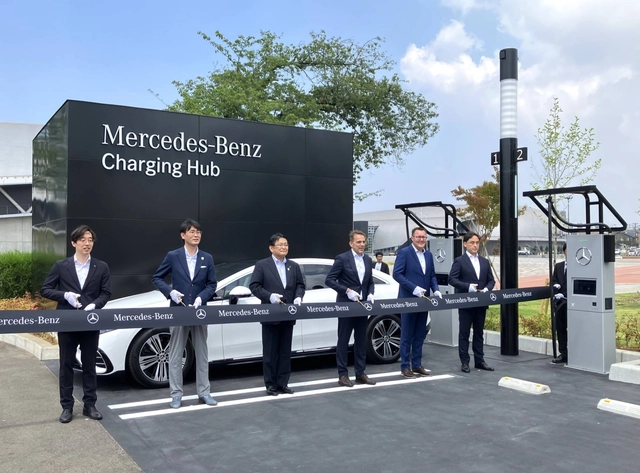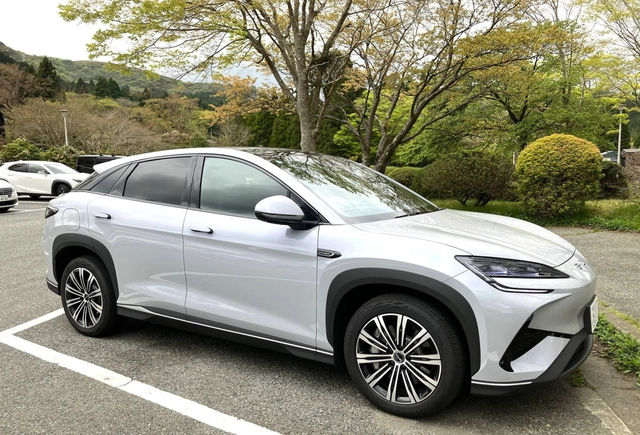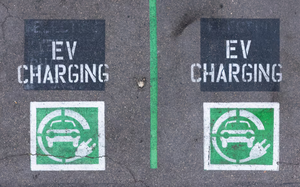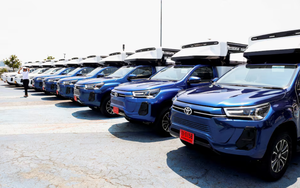
Foreign EVs hit Japan, with fast-charging network push
TOKYO -- Overseas automakers have launched a wave of new electric vehicles in Japan, a market where EVs have struggled to gain wider adoption.

Mercedes-Benz Japan opens its first 150-kilowatt fast-charging station in a park in Chiba in July 2025. Photo: Jiji Press
Independent efforts to expand charging infrastructure networks are also gathering momentum.
During Prime Minister Yoshihide Suga's tenure in 2020 and 2021, Japan unveiled its Green Growth Strategy, committing to achieve carbon neutrality, or net-zero greenhouse gas emissions, by 2050.
The plan also set a target for all new passenger vehicles sold domestically to be electrified, including EVs and hybrid models, by 2035.
Yet progress has been slow.
In 2024, EVs accounted for an anemic 1.6 pct of domestic automobile sales, even lower than more than two pct the previous year.
Nissan Motor Co.'s Sakura electric minicar enjoyed strong demand after its 2022 debut and helped raise awareness, but concerns about charging times and driving range have likely persisted, dampening broader adoption among drivers.
As Japanese automakers remain reluctant to shift away from popular hybrids, foreign rivals are challenging the status quo.
Pursuing full electrification, Audi of Germany launched the Q6 e-tron, a midsize electric SUV, this spring.
Built on a next-generation, EV-only platform jointly developed with Porsche, also a member of Volkswagen Group, the Q6 e-tron offers a range of 644 kilometers on a single charge.
An extended-range option pushes that to 731 kilometers, a development that could meaningfully ease drivers' concerns about range.
BYD Co., China's largest EV manufacturer, launched the Sealion 7 SUV in April.
Helped by a variant priced under five million yen, the model sold 416 units in Japan in May, entering the Japan Automobile Importers Association's top 10 list of imported foreign-brand vehicles for the first time.
The company plans to introduce a specially designed electric minivehicle in the second half of 2026.

BYD's Sealion 7 sports utility vehicle launched in Japan in April 2025. Photo: Jiji Press
As automakers roll out new models, charging infrastructure is drawing increased attention.
A fast-charging network built by Audi, Porsche and Volkswagen has expanded to 374 locations nationwide in three years.
By 2026, Toyota Motor Corp.'s Lexus luxury brand is set to join the partnership, allowing drivers to use chargers at any of the four brands' dealerships and other sites.
Audi has opened two high-power charging hubs in central Tokyo and a third near the Shin-Tomei Expressway interchange in Atsugi, Kanagawa Prefecture, southwest of the capital.
Each site is equipped with 150-kilowatt fast chargers and is open 24 hours a day to all EV users, regardless of brand.
Mercedes-Benz Japan Co. has followed suit.
In July, an affiliated company opened its first 150-kilowatt fast-charging station in a park in Chiba, east of Tokyo, under a cooperation agreement with the city government.
For overseas automakers, Japan looks like an underdeveloped market, with significant latent demand for EVs.
Audi Japan's brand director, Matthias Schepers, describes the country as a "blue ocean."
Schepers said Audi Japan views charging hubs as a way to ease the shortage of charging options in urban areas and aims to unlock pent-up demand among condominium residents who hesitate to buy EVs largely due to the lack of convenient access to chargers.
In the United States, the administration of President Donald Trump is reviewing incentives for EVs, while sales of hybrids, including Japanese models, remain robust.
Even so, the outlook is uncertain amid steep tariff measures launched by Trump.
If Japanese manufacturers are pushed to cultivate new markets, their powertrain strategies will face a true test.
Jiji Press
Link nội dung: https://news.tuoitre.vn/foreign-evs-hit-japan-with-fast-charging-network-push-103250825165400561.htm

